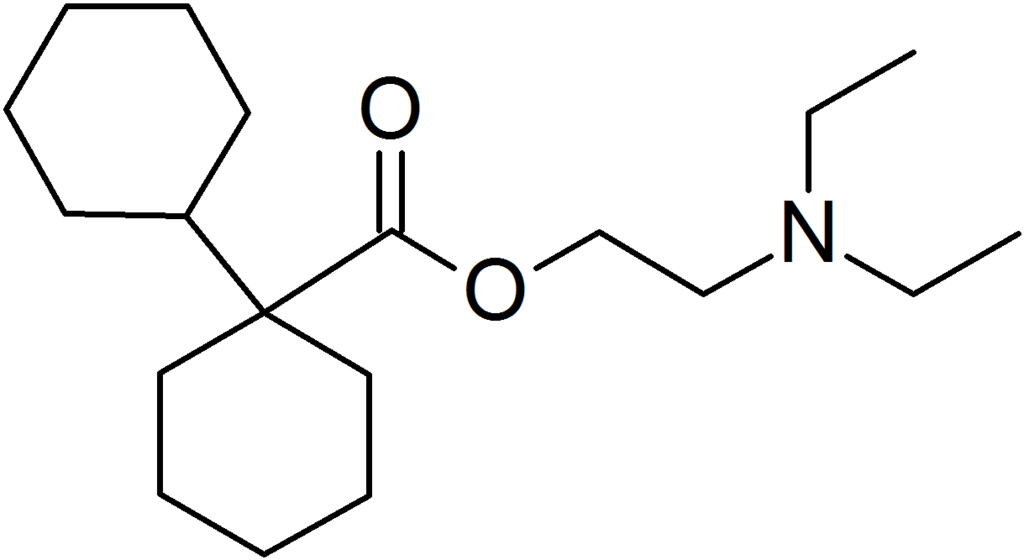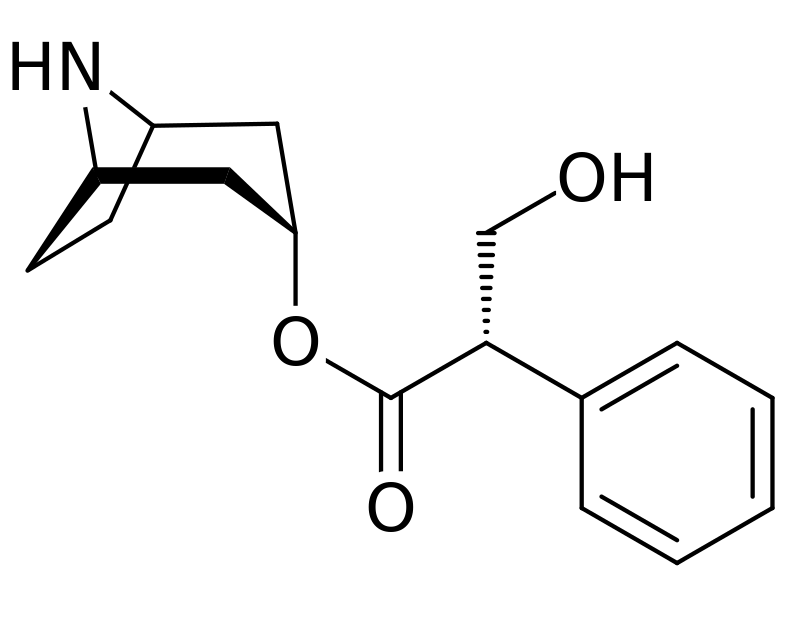What is the Difference Between Dicyclomine and Hyoscyamine
The key difference between dicyclomine and hyoscyamine is that dicyclomine is important in reducing the contraction of the muscles in the intestines, whereas hyoscyamine is important in treating irritable bowel syndrome, peptic ulcer, and gastrointestinal disorders.
Dicyclomine and hyoscyamine are important medications that can be used to treat disorders related to the gastrointestinal tract.
CONTENT
1. Overview and Key Difference
2. What is Dicyclomine
3. What is Hyoscyamine
4. Dicyclomine vs Hyoscyamine in Tabular Form
5. Summary – Dicyclomine vs Hyoscyamine
What is Dicyclomine?
Dicyclomine is a medication useful in treating a certain type of intestinal problem known as irritable bowel syndrome. It is helpful in reducing the symptoms of stomach and intestinal cramping. Dicyclomine works by slowing the natural movements of the gut and by relaxing the muscles in the stomach and intestines.

Figure 01: Dicyclomine Chemical Structure
This medication belongs to the class of drugs named as anticholinergics or antispasmodics. It must not be used by children below 6 months old. This is because of the risk of serious side effects that this medication can cause.
Dicyclomine comes mainly in the form of dicyclomine HCl. We can take this medicine by mouth. As directed by the physician, we can take it with or without food up to times 4 per day. If we need to reduce the risk of side effects, it is advisable to start the use of this medication at a low dose and gradually increase the dose. However, it is important to follow the instructions of the doctor carefully.
There are two forms of this medication: liquid form and tablet form. It is important to measure the dose carefully when taking the liquid form. We can use a measuring cup or a spoon for this measurement. Moreover, we need to mix the measured portion with an equal amount of water before taking medicine. The absorption of dicyclomine is lowered by antacids. Therefore, we shouldn’t take it alongside antacids.
The common side effects of dicyclomine include dizziness, drowsiness, lightheadedness, weakness, blurred vision, dry eyes, dry mouth, nausea, and abdominal bloating.
What is Hyoscyamine?
Hyoscyamine is an important medicine useful in treating various different stomach or intestinal problems, including cramps and irritable bowel syndrome. Moreover, it can treat bladder and bowel control problems, cramping pain caused by kidney stones and gallstones, and Parkinson’s disease.

Figure 02: Norhyocyamine, a Form of Hyocyamine
Additionally, this medication is useful in decreasing the side effects of certain medications, such as drugs that are useful in treating myasthenia gravis and some insecticides. Hyoscyamine works by reducing the production of acid in the stomach by slowing down the natural movement of the gut and by relaxing muscles in a variety of organs. Moreover, it can lessen the amount of certain body fluids. Hyoscyamine belongs to a class of drugs known as anticholinergics and antispasmodics.
There can be some common side effects of this drug, including drowsiness, dizziness, blurred vision, dry mouth, vision problems, headache, trouble sleeping, flushing, decreased sweating, etc. The serious side effects may include mood changes, fast/irregular heartbeat, difficulty urinating, decreased sexual ability, loss of condition, trouble speaking, vomiting, etc.
What is the Difference Between Dicyclomine and Hyoscyamine?
The key difference between dicyclomine and hyoscyamine is that dicyclomine is important in reducing the contraction of the muscles in the intestines, whereas hyoscyamine is important in treating irritable bowel syndrome, peptic ulcer disease, and gastrointestinal disorders.
The below infographic presents the differences between dicyclomine and hyoscyamine in tabular form for side by side comparison.
Summary – Dicyclomine vs Hyoscyamine
The key difference between dicyclomine and hyoscyamine is that dicyclomine is important in reducing the contraction of the muscles in the intestines, whereas hyoscyamine is important in treating irritable bowel syndrome, peptic ulcer disease, and gastrointestinal disorders.
Reference:
1. “Hyoscyamine Oral: Uses, Side Effects, Interactions, Pictures, Warnings & Dosing.” WebMD.
Image Courtesy:
1. “Dicyclomine-trans” By Kaet at the English-language Wikipedia (CC BY-SA 3.0) via Commons Wikimedia
2. “Norhyoscyamine” By Pancrat – Own work (CC BY-SA 3.0) via Commons Wikimedia
ncG1vNJzZmivp6x7pbXFn5yrnZ6YsqOx07CcnqZemLyue9ahmK1lmah6tbTEZpuinpaav6a6wp5km52krLKmuoydoJyxk6G8rrXNnmSappRitbq70pywmqWZo7Jw